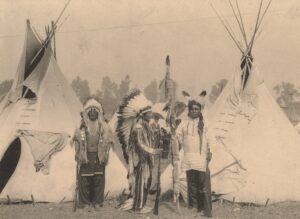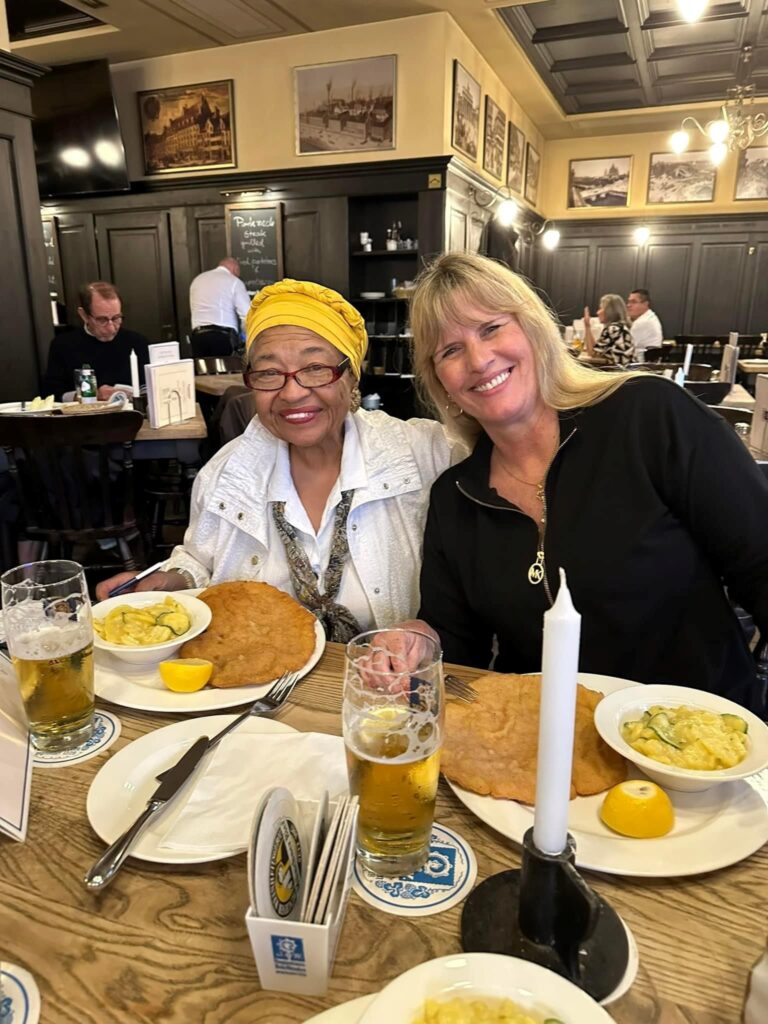By Cecilia Nadal
I have always thought that potato salad had its origin in America and of course that “spicy delicious kick” that I was accustomed to was a variation inspired by my African ancestors. So much for assumptions! I would learn on my recent three-week trip to Germany that the origins of potato salad came from Deutschland! When my plane departed St. Louis for Berlin potato salad was the farthest thing on my mind. I was one hot mess needing desperately to detox from the daily dose of bad news about the political and moral health of America. How could we possibly be at a point when democracy was being threatened? I was on a plane flying at an altitude of 36,000 ft. with a view of spectacular cloud formations and I would see the Atlantic Ocean below, yet , all I could think about was the infamous 2025 plan! It took most of the 7 ½ hour flight to Germany to think about other topics like the Transatlantic Slave Trade-that didn’t help at all!!!!! Eventually I returned to the history and extraordinary circumstances that influenced my visit to Germany. It was hard for me to believe that for seven years I had focused on the little-known fact that there were Germans in Missouri and across America that were abolitionists. The impact German immigrant abolitionists had was so significant that the world-renowned Black Abolitionist, Frederick Douglass said this, “Many noble and high-minded men, most of whom were swept over by the tide of the revolution of 1848 have become our active allies against oppression and prejudice. A German has only to be a German to be utterly opposed to slavery.” Even then Douglas received tremendous support from Germans such as journalist, Ottilie Assing, who helped him to get his book My Bondage and My Freedom published and translated in German. My interest in the contributions of German abolitionists in Missouri would take me from St. Louis to mostly rural areas throughout the State. I’d learn that St. Louis has the largest concentration of Germans in the State of Missouri and many Germans have contributed to the culture and prosperity of the St. Louis region. What I learned led me to write the play, An Amazing Story: German Abolitionists of Missouri and to organize a series of Symposia and speaking engagements about the shared history of German immigrants and African Americans in Missouri. Incredible to think that this experience now had me on a plane headed to Germany! It was this inspiring history that moved me to stretch and challenge my comfort level. At a moment when the stewardess was making an announcement, I laughed out loud thinking about my first trip to Hermann, an early 19th century German settlement on Highway 100 and now thriving tourist favorite! There I was Black and alone on a road where I saw one or two cars or trucks every few miles! What was I thinking!!?? I remember feeling very alone and nervous about whether the rural towns I was entering had a history with the Klu Klux Klan. Fortunately, the people in Hermann would allay my fears and I’d meet incredible human beings across the State.
had focused on the little-known fact that there were Germans in Missouri and across America that were abolitionists. The impact German immigrant abolitionists had was so significant that the world-renowned Black Abolitionist, Frederick Douglass said this, “Many noble and high-minded men, most of whom were swept over by the tide of the revolution of 1848 have become our active allies against oppression and prejudice. A German has only to be a German to be utterly opposed to slavery.” Even then Douglas received tremendous support from Germans such as journalist, Ottilie Assing, who helped him to get his book My Bondage and My Freedom published and translated in German. My interest in the contributions of German abolitionists in Missouri would take me from St. Louis to mostly rural areas throughout the State. I’d learn that St. Louis has the largest concentration of Germans in the State of Missouri and many Germans have contributed to the culture and prosperity of the St. Louis region. What I learned led me to write the play, An Amazing Story: German Abolitionists of Missouri and to organize a series of Symposia and speaking engagements about the shared history of German immigrants and African Americans in Missouri. Incredible to think that this experience now had me on a plane headed to Germany! It was this inspiring history that moved me to stretch and challenge my comfort level. At a moment when the stewardess was making an announcement, I laughed out loud thinking about my first trip to Hermann, an early 19th century German settlement on Highway 100 and now thriving tourist favorite! There I was Black and alone on a road where I saw one or two cars or trucks every few miles! What was I thinking!!?? I remember feeling very alone and nervous about whether the rural towns I was entering had a history with the Klu Klux Klan. Fortunately, the people in Hermann would allay my fears and I’d meet incredible human beings across the State.
We often allow our fears to impede or stifle our engagement with people that are culturally different and we assume that large swaths of a population fall within a specific and often biased narrative. Thinking about the Klan was one thing but given the polarization in our country, if I had known at that time that approximately 85% of those living in rural Missouri were Republican I don’t know if I would have had the audacity to present a play about German immigrant abolitionists back in 2018 during the rise of MAGA. I was fortunate that it all worked out in places like Hermann, Missouri where the audiences loved the play and engaged fully. I was reminded that even a liberal African American social critic can be biased! Entering the space of another culture and community is not easy but the process can definitely be incredibly and immensely gratifying if we harness our assumptions. My trip to Germany included immersion into the cultural landscape of cities like Berlin, Hamburg and Frankfurt but included excursions into small villages in Old Saxony. In East Germany I would hear Germans speaking Russian and German rather than English and German in Berlin. I was amazed by the rich history of Berlin with more than 200 museums! Berliners intentionally balance their love of nature and technology by protecting green spaces and waterways and supporting impressive and extensive transportation systems. I was impressed by the many weeping willows along the Spree river. Oddly, Berlin reminded me of why I moved to Skinker-DeBaliviere many years ago! I loved Forest Park and being close to places like the St. Louis Art Museum and the Research Library at the Historical Society on Skinker. One of my favorite meditation spots is near a small man-made lake in Forest Park where there are weeping willows nearby. It is surprising how a tree that originated in northern China can now be found all over the world! Traveling to the world-renowned Emigration Museum in the port city of Bremerhaven by the North Sea was important to my on-going study of the early 19th century German emigrants. It was at this port that tens of thousands courageously left their homeland headed for America. Some had never seen ships the size and scale of those crossing the Atlantic nor had they been close to the vast ocean and sea. Some families actually turned around and went home because they were so frightened.
I would learn much about the  shifting sands of German history and experience the food culture of bread, sausages, fleischsalat (Bologna salad) and beer in Germany. The food was terrific ranging from popular street foods like currywurst to Schnitzel and Pork Knuckle with sauerkraut. The diversity of foods in Germany is astounding including influences from France, Turkey, Italy and many other countries. Before going to Germany, a beer was just a beer but when I returned to St. Louis and reconnected with friends in the Loop I had a better understanding of their choices. When I got back to St. Louis, I was running some errands between Union Blvd. and DeGiverville and recalled reading that during WWI one of the streets in that area was changed from Berlin Avenue to Pershing Avenue due to anti-German sentiment in St. Louis. I knew of this history and had learned that in Missouri many towns with German names were renamed because of the war and Hitler. There were even POW camps for German soldiers in the Show Me State! I began making interesting connections between people and places. For example, Dr. Selam Deutschmann, a highly regarded Chiropractor on Delmar Blvd., whom I have known for years, is originally from Ethiopia and carries the last name Deutschmann! Why? Selam chose to honor his German adoptive parents from Iowa who were pivotal to his success! When I boarded the plane from Frankfurt to return home, I was reminded that when we are engaged in work that brings people together and we stretch to look for opportunities to do so in unlikely places there is not time to allow the news to affect our dedication. Our work of nurturing authentic relationships with love is the radical remedy for protecting democracy. Finally, just a friendly reminder, potato salad is from Germany and “German Chocolate Cake” is wholly American!
shifting sands of German history and experience the food culture of bread, sausages, fleischsalat (Bologna salad) and beer in Germany. The food was terrific ranging from popular street foods like currywurst to Schnitzel and Pork Knuckle with sauerkraut. The diversity of foods in Germany is astounding including influences from France, Turkey, Italy and many other countries. Before going to Germany, a beer was just a beer but when I returned to St. Louis and reconnected with friends in the Loop I had a better understanding of their choices. When I got back to St. Louis, I was running some errands between Union Blvd. and DeGiverville and recalled reading that during WWI one of the streets in that area was changed from Berlin Avenue to Pershing Avenue due to anti-German sentiment in St. Louis. I knew of this history and had learned that in Missouri many towns with German names were renamed because of the war and Hitler. There were even POW camps for German soldiers in the Show Me State! I began making interesting connections between people and places. For example, Dr. Selam Deutschmann, a highly regarded Chiropractor on Delmar Blvd., whom I have known for years, is originally from Ethiopia and carries the last name Deutschmann! Why? Selam chose to honor his German adoptive parents from Iowa who were pivotal to his success! When I boarded the plane from Frankfurt to return home, I was reminded that when we are engaged in work that brings people together and we stretch to look for opportunities to do so in unlikely places there is not time to allow the news to affect our dedication. Our work of nurturing authentic relationships with love is the radical remedy for protecting democracy. Finally, just a friendly reminder, potato salad is from Germany and “German Chocolate Cake” is wholly American!




